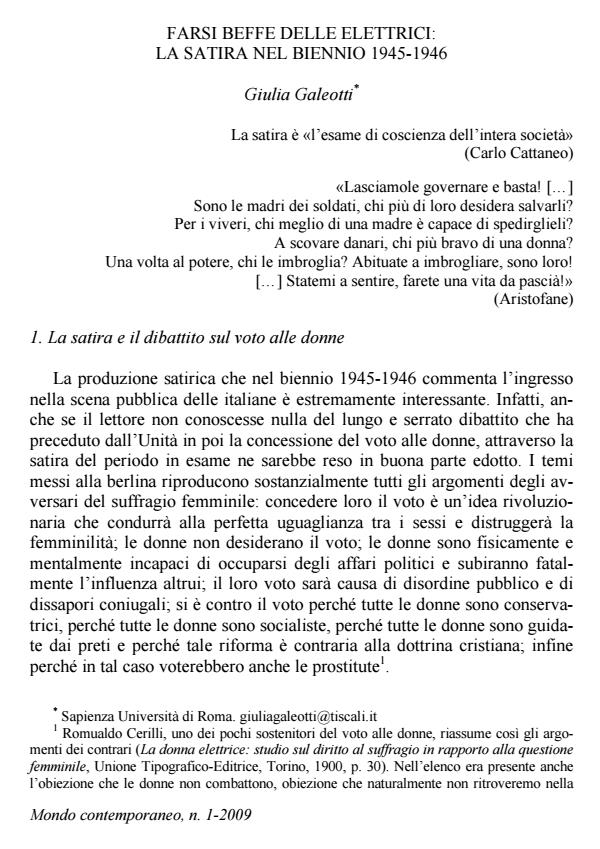Farsi beffe delle elettrici: la satira nel biennio 1945-1946
Titolo Rivista MONDO CONTEMPORANEO
Autori/Curatori Giulia Galeotti
Anno di pubblicazione 2009 Fascicolo 2009/1
Lingua Italiano Numero pagine 23 P. 151-173 Dimensione file 863 KB
DOI 10.3280/MON2009-001006
Il DOI è il codice a barre della proprietà intellettuale: per saperne di più
clicca qui
Qui sotto puoi vedere in anteprima la prima pagina di questo articolo.
Se questo articolo ti interessa, lo puoi acquistare (e scaricare in formato pdf) seguendo le facili indicazioni per acquistare il download credit. Acquista Download Credits per scaricare questo Articolo in formato PDF

FrancoAngeli è membro della Publishers International Linking Association, Inc (PILA)associazione indipendente e non profit per facilitare (attraverso i servizi tecnologici implementati da CrossRef.org) l’accesso degli studiosi ai contenuti digitali nelle pubblicazioni professionali e scientifiche
The Enfranchisement of Italian Women in the Political Satire of the Years 1945 and 1946 - The satire that in the years 1945 and 1946 commented the enfranchising of the Italian women replicated most of the themes emerged since the reunification of the country, in the year 1861: their lack of interest in politics, their political naiveté and therefore their asserted easy manipulability. The study of articles, short stories, riddles and cartoons of the time seems to confirm that the Italian society was not ready for women’s entry into politics, beyond political and cultural differences. The author underlines however the surprising absence of a theme which had played a big role in the debate of the pre-Fascist years: the old concern that women’s new political rights would have broken up the traditional balance inside family life. The author suggests that the main target of the time (in a kind of political maturation) were not women voters as such, but other subjects, along the same line followed by Aristophanes: when he presented Athens governed by women, his target were not female malice and luxury, but instead men’s incapacity to govern a city in decline. The same happened at beginning of the foundation of the Italian Republic: the political satire invested the two main political parties that strongly supported the universal suffrage and were expected to gain most from it, the Christian Democratic Party and the Communist Party. Key words: political satire, women enfranchising, Bonomi Act January 1945, Italian elections 2 June 1946, the crises of politics, women and politics.
Giulia Galeotti, Farsi beffe delle elettrici: la satira nel biennio 1945-1946 in "MONDO CONTEMPORANEO" 1/2009, pp 151-173, DOI: 10.3280/MON2009-001006